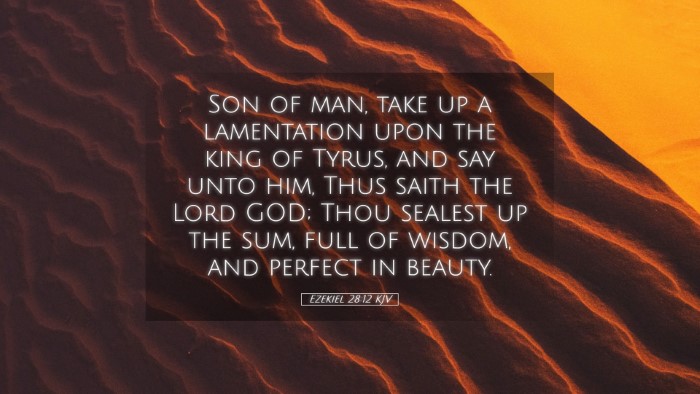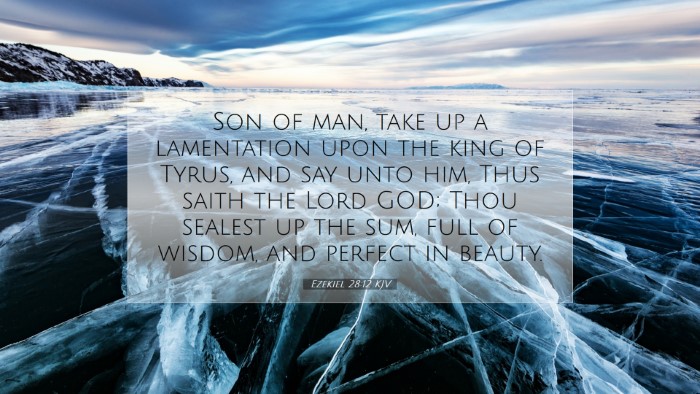Ezekiel 28:12 - Commentary Summary
Verse: "Son of man, take up a lamentation upon the king of Tyrus, and say unto him, Thus saith the Lord God; Thou sealest up the sum, full of wisdom, and perfect in beauty."
Introduction
The verse from Ezekiel 28:12 offers a profound insight into the nature of pride, beauty, and wisdom, as exemplified by the King of Tyre. While addressing the prophetic lamentation over Tyre and its king, the passage also serves as a metaphorical description of the fall of Lucifer, illustrating key theological concepts regarding sin, sovereignty, and divine judgment.
Contextual Analysis
This chapter focuses on both the literal and figurative leaders of the nation of Tyre. Tyre was renowned for its wealth, trade, and maritime power. Ezekiel's lamentation serves not only as a warning to the King of Tyre personally but also as a representation of the city's pride and imminent downfall.
Historical Background
Tyre was a major trading city in the ancient Near East, famed for its resources, including the purple dye extracted from mollusks, and its innovative architecture. The king of Tyre, who had amassed wealth and resources, became a symbol of hubris. The prophetic address serves as both a critique of this arrogance and a forecast of judgment from God.
Thematic Insights
Wisdom and Beauty
Albert Barnes emphasizes the phrase "sealest up the sum," asserting that it signifies completeness and fullness in wisdom and beauty. The king's attributes are depicted as admirable yet corruptible; thus, how he squandered these gifts reflects humanity's tendency to misuse divine endowments.
Pride Before the Fall
Matthew Henry reflects on how the king, being full of wisdom and beauty, succumbs to pride, leading to his ultimate destruction. This notion echoes the broader biblical principle that before destruction comes haughtiness (Proverbs 16:18). The commentary highlights that even the most exalted can face judgment if they allow pride to obscure their humility before God.
The Nature of Divine Judgment
Adam Clarke points out that this lamentation serves as a warning. God's judgment is not only a consequence of the king's pride but an inevitable principle of divine justice that applies universally. The accountability of leaders, who are often seen as the epitome of strength and wisdom, is significant; their failures have broader implications for their people.
Symbolism of the King of Tyre
This passage has often been interpreted as more than just a lament for an earthly ruler. The imagery encapsulates themes of spiritual warfare, representing the pride and rebellion of Satan against God. As the text transitions from the king’s attributes to his rebellion, it points towards the universal struggle between good and evil.
Spiritual Implications
Matthew Henry interprets the lamentation as not only a prophecy for Tyre but a theological reflection on the nature of sin. The beauty and wisdom bestowed by God can become a catalyst for arrogance when individuals forget the source of their gifts. This shift in focus to self can lead to severe spiritual consequences.
Application for Believers
For contemporary readers, particularly pastors, theologians, and scholars, this passage calls into reflection the importance of humility and the dangers of succumbing to pride. It urges believers to consider how they can utilize their gifts in service of God rather than for self-exaltation.
Lessons on Faith and Leadership
- Humility in Authority: Leaders in both ecclesiastical and secular realms must remain conscious of their dependence on God, recognizing that wisdom and success come from Him.
- The Dangers of Self-sufficiency: As reflected in the king's downfall, reliance on one’s strength or understanding can lead to spiritual blindness and eventual doom.
- Divine Mercy and Judgment: God's judgments are designed for restoration. The warning is not merely punitive but serves to redirect the hearts of leaders and nations back to Him.
Conclusion
The lamentation over the king of Tyre in Ezekiel 28:12 is a compelling reminder of the dual nature of divine gifts—wisdom and beauty—as well as the perils of pride that can ensue. As scholars and believers delve into the deeper meanings of this verse, they are encouraged to reflect on their own stewardship of God-given resources and the necessity of humility in the face of greatness.


